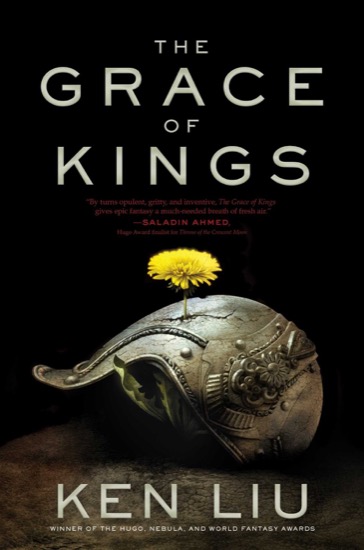Here’s a book I totally recommend — The Grace of Kings by Ken Liu:
(Image from Ken Liu’s official website)
Here’s a quick rundown of the plot:
On the islands of Dara, an Emperor united all the seven territories and rules with an iron first. Then, he dies, and his 12-year-old son takes over. The new Emperor is a puppet and decisions are made from his closest aides. Soon, different rebel factions form and everyone stakes their claim to the throne. From this unrest, we follow two contenders — Kuni Garu, a ne’er do well former bandit with ideas and tricks, and Mata Zyndu, who is the heir of a family of warriors who were cast out by the tyrant.
Warning: This section will contain spoilers. Please read at your own disrection.
What I Liked About This Book:
So if you’re familiar with my blog and Chinese history, you’d totes recognise that Liu is writing about The First Emperor and everythin’ that happened so that Liu Bang could establish the Han dynasty. Some of these incidences were from Sima Qian’s version of how shiz went down, like the bit about Zhao Gao tellin’ the second Emperor that a deer was a horse, and the whole bit ‘bout Kuni Garu, who is very much like Liu Bang, rallying his followers by killing a snake. There are so many incidents that were pulled from the history books and re-written in his style, which made the Chinese history geek squee in me.
I mean, it’s also easy to equate Kuni Garu to Liu Bang and Mata Zyndu to Xiang Yu, but doing that diminished the quality of the book as Liu deviates from certain events too.
‘Cause this book is really progressive, is why, and Liu’s women aren’t objects but people of agency.
But I’mma talk about how Kuni Garu sees women first.
So in one scene, Mata Zyndu and Kuni Garu are locked in a city by one of their enemies. Instead of showing them they are trapped, Garu stages a party and acts like his soldiers have plenty to eat, so the enemy gets real fed-up. In fact, he gets so fed-up that he tries to insult them and says that Garu and Zyndu are like women. There are even drawings, to boot. Zyndu flips his shiz, but Garu is all, “Oh yeah, I guess they’re telling me I should slim down, though I totally look good in that dress. My wife should see it.”
And then he totally chides Mata Zyndu for thinkin’ that being a girl is an insult.
Of course, there are the women who make this story. You have Jia Matiza, Garu’s wife, who is knowledgeable about herbs and isn’t afraid to do whatever it takes to help Garu remain in power. When they separate because of the unrest, she cheats on him, her husband gets mad, and they make up. But she suggested that he take a second wife so that their enemies would think that he was no longer a threat and wouldn’t come back for her.
Sure, Matiza is initially resentful of Garu’s second wife, but they work together. And Lady Risana — Garu’s second wife has a few ideas of her own.
And Liu even throws a wily Lady Marshall by the name of Gin Mazoti — by far, my favourite character as she comes up with the most amazing plans to thwart the enemy and cement his rule.
There are also lots of hints and nods to Chinese traditions — the philosophy of a certain Kon Fiji (a distorted version of Confucius) is mentioned about honouring one’s parents, and the tradition of an Emperor slaughtering all the generations of his political enemies is alluded to as well.
And the fight scenes? Imagine reading an wuxia novel in English. That’s how it was like to me.
Okay, enough fangirling.
Here’s what I didn’t like:
The names. I know it’s not 100% influenced by Chinese culture, but it would have been rad if Liu had used Chinese names in his book so that we could imagine them as Chinese people. But of course, the different names have red/blonde/ whatever coloured hair and Liu obviously ran away with his imagination to make people look as diverse as possible. There are also some Greek (or is it Roman?) influences here and there, but I couldn’t help but feel that everyone should have Chinese names since the story was adapted from Chinese culture.
Liu also kills off a lot of characters. Like, a lot. Okay, some of them are dickheads and they totally deserve it, but I felt like some could have been crucial to the plot and made things a lot more interesting, like Princess Kikomi for example.
Then, there are the gods who pick and choose their champions who get to rule. Although it was intriguing to see how the divine powers affect the fate of the mortals on Earth, I thought the book would have been better if these parts were skipped entirely.
But if you love wuxia, Chinese history and culture as well as epic fantasy, this book is for you. Go forth and enjoy.
8/10
